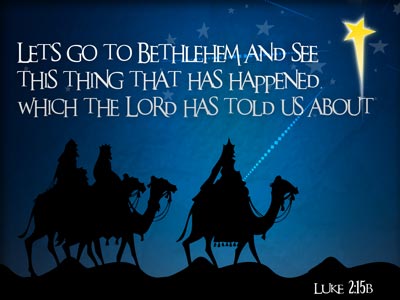-
O Little Town Of Bethlehem Series
Contributed by Glenn Durham on Nov 28, 2017 (message contributor)
Summary: God humbles himself to save a people who have fallen very low indeed.
Scripture Introduction
Probably few of us are really familiar with the twelve books in the section of the Old Testament called the “Minor Prophets.” They are not unimportant, but small books compared to Isaiah, Jeremiah, and Ezekiel – the Major Prophets.
Pastor James Boice, who preached through the twelve Minor Prophets on and off over a period of ten years, said that these books especially “dramatize three aspects of God’s character: his sovereignty, his holiness, and his love.” Micah fits in this section both in size and in focus.
Even if you are unfamiliar with Micah’s ministry and message, you may hear some verses you recognize, especially at the beginning and end of our text. We start in Micah 5.1 with the promise of a future ruler who will shepherd his people, read through the warnings of danger and destruction, and end with the proper response to God’s power and presence in Micah 6.8. Please, now, give your attention to the reading of this portion of Scripture as God speaks to us through the Word and Spirit, even as he did to Israel so long ago.
[Read Micah 5.1-6.8. Pray.]
Introduction
Last week our family watched The Nativity Story, a 2006 film which portrays the life of Mary (the mother of Jesus) from her betrothal to Joseph through the Massacre of the Innocents. To pace the story and provide historical and theological insight, the filmmaker intertwined events in Mary’s life with that of the three wise men and King Herod. Three sets of characters with very different histories and purposes, whose stories merge in the events surrounding Jesus’ birth. [I thought the movie was very well-done; we all thoroughly enjoyed and appreciated it.]
Watching it reminded me again of the power of the pride which kept Herod and the Jews from accepting the Messiah they had so long hoped for. The film powerfully portrayed the self-love which motivated their behavior.
Matthew tells us what happened. Astrologers from the Orient saw the signs and traveled west to honor the child born king of the Jews. Of course, they went straight to Jerusalem, for that was the city of kings. But no royal baby had been born. So where was he?
King Herod, anxious about his own hold on power and the political turmoil that might follow another messianic claim, nervously assembles the religious leaders and experts in the Scriptures (priests and scribes), and asks them what the scrolls say about the Christ, the anointed one. They say, “He will be born in Bethlehem, for so for so it is written by the prophet.”
So the wise men go to Bethlehem to worship. In her play based on the life Christ, Dorothy Sayers explains their attitude by having one of the Magi say, “No place is too lowly to kneel in.” The nature of the King prompted worship; the location did not matter.
But the Scribes and Priests do not follow the wise men; they despise the prophecy. Herod, on the other hand, believes the prophecy, but rather than travel to Bethlehem to worship, he sends soldiers to murder all the male babies in that town.
What is the difference between the wise men and these others who knew so well the promise of Micah? They did not lack knowledge – remember that they are the ones who direct the wise men to Bethlehem. They knew the scriptures, but they did not respond in faith. Why not? What was missing to convert knowledge into saving faith?
During advent we are studying the theology of the prophets and carols. Christmas Carols are some of the most universally loved songs in our language, and, as it turns out, they contain some of the most profoundly Biblical teaching. Today we consider O Little Town of Bethlehem. The answer to my question is implied in this carol, just as it is revealed in the prophecy of Micah.
The key appears in verse 3: “No ear may hear his coming, but in this world of sin, where meek souls will receive him, still the dear Christ enters in.” Meek souls: those who depend on God for everything, who have nothing in themselves to garner God’s favor, but rejoice to receive all freely of grace. Bethlehem was the humblest of towns, and this song is about a humble God for a humble people.
Pride kept Herod and the religious Jews away from Bethlehem and the King – how do we ensure the same does not happen to us? First the Bible tells us that…
1. We Must Join In Worship of the Humble God
When the wise men asked, “Where is the King?”, Herod knew exactly where to find the answer. The priests and scribes had long studied the holy writings in the hopes of seeing the Messiah deliver them, so they know the answer is Bethlehem.

 Sermon Central
Sermon Central



